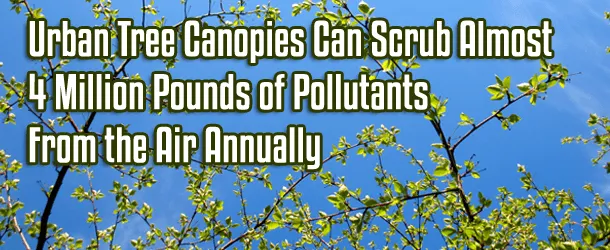
- Share on Facebook3
- Share on Pinterest
- Share on Twitter
As people look for new technologically advanced products to improve the environmental quality of our lives, one overlooked and undervalued item that does more for the environment than you can imagine, is a tree. Trees improve the environment in which we live by improving the air quality, providing energy savings, offering more habitats and sheer beauty.

Improving Air Quality
Air quality is vastly improved through the use of trees and shrubs. Leaves filter the air we breathe by removing dust and other particulates. Rain then washes the pollutants to the ground. Leaves take carbon dioxide from the air and give off oxygen. Leaves also absorb other air pollutants—such as ozone, carbon monoxide, and sulfur dioxide.
A study done by Greenscape in Jacksonville, Fl., determined that Jacksonville’s urban tree canopy scrubbed 3.8 million pounds of pollutants from the air, annually. This equates to 7.5 lbs of pollution per person in Jacksonville. This is value. These trees are improving the air quality of the lives of these people.
Energy Savings
Strategically planted trees can be an effective energy saving measure. They can help reduce your heating and cooling costs. “If you plant a tree today on the west side of your home, in 5 years your energy bills should be 3% less. In 15 years the savings will be nearly 12%.” —Dr. E. Greg McPherson, Center for Urban Forest Research
A recent study completed by the Department of Agriculture determined that the net cooling effect of a young, healthy tree is equivalent to ten room-size air conditioners operating 20 hours a day. This is incredible savings for homeowners who want to reduce their electric bills and increase their property value by adding the beauty of a tree.
Habitat and Beauty
Trees are a great source of shelter and food for many insects, birds and small animals. Trees provide prime nesting habitat for birds and squirrels. Insects feed on all parts of a tree, from the leaves and bark, to the roots. Birds and mammals are dependent on trees for insects and also nest and live in the holes in trees. Trees also provide shade and can reduce water temperature when they are located along the banks of water sources such as rivers, streams or lakes.
In addition, trees add a natural beauty and character to our landscapes. They add color with flowers and leaves, and can be used to soften the harsh effects of cement and glass. Their beauty makes life more pleasant.
Take Action
The benefits of urban trees can make a huge difference to communities. Obviously, one can begin by going out and planting a tree in their yard. But, let me challenge you to take up a greater cause: plant trees all over your community. There are about 60– to 200-million spaces along our city streets where trees could be planted. This translates to the potential to absorb 33 million more tons of CO2 every year, and saving $4 billion in energy costs.” —National Wildlife Federation
What are we waiting for? Instead of the “Me” generation, let’s be known as the “Tree” generation! Let’s make trees a major asset of communities all over the world!
– Linda Ingham
As a mother of five, licensed attorney and fitness nut, Linda Ingham enjoys writing about many subjects, including law, gardening, health and fitness, child rearing and travel. Check out her articles at www.pathacross.com
- Share on Facebook3
- Share on Pinterest
- Share on Twitter

